Mar 20

You can Support Project Access today!
Newsletter/September 2016
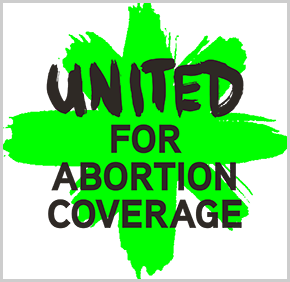 Join us on September 29 for a brave action for a future without Hyde! For 40 years, politicians have used the Hyde Amendment to deny abortion coverage for those struggling to get by and this year we are coming together to say: Enough is enough!
Join us on September 29 for a brave action for a future without Hyde! For 40 years, politicians have used the Hyde Amendment to deny abortion coverage for those struggling to get by and this year we are coming together to say: Enough is enough!
On Thursday, September 29 at 6pm, the Reproductive Health Access Project is hosting a Hyde UnHappy Hour to support efforts to lift abortion coverage bans. If you are as unhappy as we are about the Hyde Amendment, join us for this exciting evening of food, drinks, live performances, and activism.
The event will be hosted by local comedians Eve Peyser and Melissa Rocha and will feature a variety of local performers including Josh Gondelman from Last Week Tonight, Jena Friedman, Shalewa Sharpe, and Subhah Agarwal. We’ll also have a raffle featuring items from pro-choice businesses like Babeland, Free Range Wine and Spirits, The Public Theatre, Bitch Media, Ms. Magazine, and more!
This year’s Hyde UnHappy Hour will take place at Littlefield, a diverse performance and art space in Brooklyn’s Gowanus neighborhood. Don’t miss this exciting evening of entertainment and activism. Get your tickets today!
The Reproductive Health Access Project is an All* Above All coalition partner. All* Above All unites organizations and individuals to build support for lifting the bans that deny abortion coverage. Our vision is to restore public insurance coverage so that everyone, however much they make, can get affordable, safe abortion care when they need it.
Every year, RHAP selects a group of primary care physicians who are dedicated to providing and teaching reproductive health care within family medicine for our Fellowship program. Take some time to get to know the wonderful physicians who have joined our team for our year-long Reproductive Health Care and Advocacy Fellowship (RHA) and the two-year Empire Clinical Research Investigator Program (ECRIP).
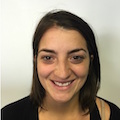 Moira Rashid (RHA Fellow) – Moira was born in Western Massachusetts and moved to the San Francisco Bay Area as a child. She studied cultural anthropology and Spanish literature as an undergraduate at UC San Diego. The experience of studying other cultures sparked her interest in health as a human right. Moira went back to the East Coast for medical school at Tufts University, where she also pursued an MPH. While at Tufts, she worked closely with Physicians for Human Rights and the Tufts Student Run Free Clinic, where she established reproductive health services for uninsured and homeless women. Moira did her residency at the University of California, San Francisco where she pursued family medicine to combine her passions for human rights, underserved medicine, and women’s health. She applied to the Reproductive Health Care and Advocacy Fellowship in order to become a teacher within family medicine. In her career, Moira wants to work towards policy change in reproductive health care and teach future providers to provide compassionate, full-spectrum reproductive health.
Moira Rashid (RHA Fellow) – Moira was born in Western Massachusetts and moved to the San Francisco Bay Area as a child. She studied cultural anthropology and Spanish literature as an undergraduate at UC San Diego. The experience of studying other cultures sparked her interest in health as a human right. Moira went back to the East Coast for medical school at Tufts University, where she also pursued an MPH. While at Tufts, she worked closely with Physicians for Human Rights and the Tufts Student Run Free Clinic, where she established reproductive health services for uninsured and homeless women. Moira did her residency at the University of California, San Francisco where she pursued family medicine to combine her passions for human rights, underserved medicine, and women’s health. She applied to the Reproductive Health Care and Advocacy Fellowship in order to become a teacher within family medicine. In her career, Moira wants to work towards policy change in reproductive health care and teach future providers to provide compassionate, full-spectrum reproductive health.
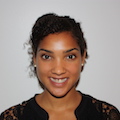 Aisha Wagner (RHA Fellow) – Aisha was born in Los Angeles and has lived up and down the West Coast. She decided to go to medical school after working for several years at UCSF’s Women’s Option Center. Aisha loves women’s health and reproductive justice and is excited to continue working with vulnerable communities here on the East Coast, with the hope of one day integrating family planning and abortion seamlessly into her patient care. Aisha attended the Keck School of Medicine of the University of Southern California and completed the University of California, San Francisco Family and Community Residency Program.
Aisha Wagner (RHA Fellow) – Aisha was born in Los Angeles and has lived up and down the West Coast. She decided to go to medical school after working for several years at UCSF’s Women’s Option Center. Aisha loves women’s health and reproductive justice and is excited to continue working with vulnerable communities here on the East Coast, with the hope of one day integrating family planning and abortion seamlessly into her patient care. Aisha attended the Keck School of Medicine of the University of Southern California and completed the University of California, San Francisco Family and Community Residency Program.
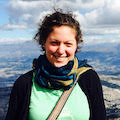 Lael Greenstein (RHA Fellow – Boston) – Lael grew up in New York City and went to Wellesley College, where she took no premedical courses. After dabbling in other professions, she moved to Philadelphia for medical school and stayed there for her residency. Lael’s decision to become a physician was founded in her love of discussing bodily functions combined with a passion for social justice, particularly addressing inequities in health care quality and access. Family medicine became Lael’s clear profession, as it provided her with the close relationships and commitment to underserved medicine that she was seeking. Her interest in reproductive health emerged not only from her love of women’s health, but also through its intersection with improving health outcomes among more disadvantaged communities. Lael applied to the Reproductive Health Care and Advocacy Fellowship in order to acquire the abortion training skills she did not receive in residency, with the goal of becoming an abortion provider in a community health setting. Through this fellowship, she is hoping to learn the clinical, legal, and advocacy skills necessary to increase abortion access within community clinics, specifically Federally Qualified Health Centers, which she see as crucial to improving reproductive health nationwide.
Lael Greenstein (RHA Fellow – Boston) – Lael grew up in New York City and went to Wellesley College, where she took no premedical courses. After dabbling in other professions, she moved to Philadelphia for medical school and stayed there for her residency. Lael’s decision to become a physician was founded in her love of discussing bodily functions combined with a passion for social justice, particularly addressing inequities in health care quality and access. Family medicine became Lael’s clear profession, as it provided her with the close relationships and commitment to underserved medicine that she was seeking. Her interest in reproductive health emerged not only from her love of women’s health, but also through its intersection with improving health outcomes among more disadvantaged communities. Lael applied to the Reproductive Health Care and Advocacy Fellowship in order to acquire the abortion training skills she did not receive in residency, with the goal of becoming an abortion provider in a community health setting. Through this fellowship, she is hoping to learn the clinical, legal, and advocacy skills necessary to increase abortion access within community clinics, specifically Federally Qualified Health Centers, which she see as crucial to improving reproductive health nationwide.
 Cynthia Calixte (ECRIP) – Cynthia is joining RHAP as an Empire Clinical Research Investigator Reproductive Health fellow. After learning about RHAP in medical school, she became a supporter of the organization, and is thrilled to be joining this team. Cynthia will be conducting clinical research in addition to obtaining further training in reproductive health, as well as a master’s degree in public health during her time here. Cynthia is a New York native, grew up in Valley Stream, Long Island, and is a graduate of the Sophie Davis BS/MD program at City College and SUNY Downstate Medical College. She completed her family medicine residency training at the University of Maryland in Baltimore.
Cynthia Calixte (ECRIP) – Cynthia is joining RHAP as an Empire Clinical Research Investigator Reproductive Health fellow. After learning about RHAP in medical school, she became a supporter of the organization, and is thrilled to be joining this team. Cynthia will be conducting clinical research in addition to obtaining further training in reproductive health, as well as a master’s degree in public health during her time here. Cynthia is a New York native, grew up in Valley Stream, Long Island, and is a graduate of the Sophie Davis BS/MD program at City College and SUNY Downstate Medical College. She completed her family medicine residency training at the University of Maryland in Baltimore.
 Olivia Perlmutt (ECRIP) – Olivia’s path to the Reproductive Health ECRIP Research Fellowship has been built upon multiple experiences. She first became interested in women’s reproductive health as a volunteer at the Red Cross in Santiago, Chile. There, she saw firsthand the importance of, and complications to, providing women’s health care. The desire to serve women stayed with her throughout college, working in research, and medical school in Rhode Island, New York City, and North Carolina. All these places and situations gave Olivia a different perspective on how she wanted to be involved in reproductive health care. She not only wants to be a good family physician in primary care, but also a physician with the manual skills to provide full-spectrum reproductive health care. Olivia is so excited to contribute to the grander research community in this important field. This fellowship has all the aspects of the kind of physician Olivia wants to be, and she feels so honored to be a part of it.
Olivia Perlmutt (ECRIP) – Olivia’s path to the Reproductive Health ECRIP Research Fellowship has been built upon multiple experiences. She first became interested in women’s reproductive health as a volunteer at the Red Cross in Santiago, Chile. There, she saw firsthand the importance of, and complications to, providing women’s health care. The desire to serve women stayed with her throughout college, working in research, and medical school in Rhode Island, New York City, and North Carolina. All these places and situations gave Olivia a different perspective on how she wanted to be involved in reproductive health care. She not only wants to be a good family physician in primary care, but also a physician with the manual skills to provide full-spectrum reproductive health care. Olivia is so excited to contribute to the grander research community in this important field. This fellowship has all the aspects of the kind of physician Olivia wants to be, and she feels so honored to be a part of it.
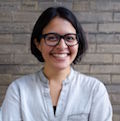 Seema Shah (ECRIP/RHA) – Seema came to the Institute for Family Health as a resident, and has had an incredible past year of growth as a Reproductive Health Care and Advocacy Fellow, with amazing mentors and colleagues. She is happy to have the Institute continue as her home. As an ECRIP research fellow, Seema looks forward to improving her skills in health care delivery, while continuing patient care at the Walton Family Practice in the Bronx. With this training, Seema hopes to continue working in patient care, services improvement, teaching and advocacy to support primary care, and reproductive health access at different levels.
Seema Shah (ECRIP/RHA) – Seema came to the Institute for Family Health as a resident, and has had an incredible past year of growth as a Reproductive Health Care and Advocacy Fellow, with amazing mentors and colleagues. She is happy to have the Institute continue as her home. As an ECRIP research fellow, Seema looks forward to improving her skills in health care delivery, while continuing patient care at the Walton Family Practice in the Bronx. With this training, Seema hopes to continue working in patient care, services improvement, teaching and advocacy to support primary care, and reproductive health access at different levels.
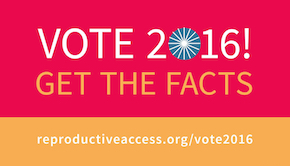
After more than a year of campaigning, the presidential primaries are (finally!) over and the candidates confirmed. Now it’s time focus on the issues.
There is a lot at stake in this election beyond who becomes President. The Senate majority may change, and there is likely to be a shake up in the House of Representatives as well. The future of the Supreme Court may be the biggest reason we should all think carefully at the polls this November. The next President is likely to appoint two to three judges in their first term alone – Justice Scalia’s seat on the Supreme Court is still vacant and two judges will be in their 80s and one will be 78 on Election Day.
A lot is going on at the state level as well. There are 149 approved state ballot measures in 35 states, which is just two less than what was approved by this time in the 2014 mid-term elections. And while none of the ballot initiatives so far target access to reproductive health care directly (unlike the mid-term elections in 2014, when there were several state ballot initiatives that affected access to birth control and abortion), the state ballots do cover issues such as education, the minimum wage, health care access, and gun control, all critical issues that intersect with reproductive justice.
Before heading to the polls this November, educate yourself on what is on the ballot in your state. There is plenty of time to register to vote and get the facts before you vote on November 8th!
It’s up to you!
 Save the Date! Our friends at Lady Parts Justice are hosting their first annual Golden Probe Awards on October 2! What better way to highlight just how many politicians are declaring war on reproductive rights than having an award show “honoring them” during election season!
Save the Date! Our friends at Lady Parts Justice are hosting their first annual Golden Probe Awards on October 2! What better way to highlight just how many politicians are declaring war on reproductive rights than having an award show “honoring them” during election season!
Visit goldenprobes.com for more info on this great event. You can also find out more info about Lady Parts Justice at ladypartsjustice.com.
Your gift allows us to train and support health care providers across the United States so they can offer patients compassionate and comprehensive care.
Mar 20
